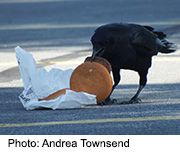- Could Your Grocery Store Meat Be Causing Recurring UTIs?
- Are You Making This Expensive Thermostat Error This Winter?
- Recognizing the Signs of Hypothyroidism
- 10 Strategies to Overcome Insomnia
- Could Artificial Sweeteners Be Aging the Brain Faster?
- Techniques for Soothing Your Nervous System
- Does the Water in Your House Smell Funny? Here’s Why
- Can a Daily Dose of Apple Cider Vinegar Actually Aid Weight Loss?
- 6 Health Beverages That Can Actually Spike Your Blood Sugar
- Treatment Options for Social Anxiety Disorder
Caw-lesterol? Fatty City Food Hits Crows’ Arteries

Your lunch leftovers are doing no favors for urban birds’ hearts, new research shows.
Fatty food scraps may be boosting the cholesterol levels of crows in U.S. cities, but whether it’s a threat to their health isn’t clear.
A team from Hamilton College in Clinton, N.Y., analyzed blood cholesterol levels of 140 crow nestlings in urban and rural areas of California. Those in urban areas had higher levels of cholesterol than those in rural areas, the findings showed.
The researchers also tested the impact of human food by giving nestlings in rural New York state a regular supply of cheeseburgers. They then compared the cholesterol levels of those crows with nearby nestlings that didn’t get cheeseburgers.
The cheeseburger-fed nestlings’ cholesterol levels were higher, and comparable to those of the city-dwelling crows in California.
But whether higher cholesterol is bad for crows is uncertain.
“Despite all the bad press that it gets, cholesterol has benefits and serves a lot of essential functions,” said study author Andrea Townsend, an assistant professor of biology.
“It’s an important part of our cell membranes and a component of some crucial hormones. We know that excessive cholesterol causes disease in humans, but we don’t know what level would be ‘excessive’ in a wild bird,” she explained.
The study was published Aug. 26 in The Condor: Ornithological Applications journal.
The researchers followed the nestlings for their first three years of life and found that survival rates were lower for urban crows than rural ones, but they concluded that cholesterol wasn’t a factor. Among the New York crows, nestlings with higher cholesterol levels had better scores on assessments of body condition, according to the researchers.
But people shouldn’t start giving processed foods to birds at their feeders.
“Wild birds haven’t evolved to eat processed food, and it might have negative consequences that we didn’t measure, or that will only show up over longer periods of time,” Townsend said in a journal news release.
“Feeding wild birds can be a great way to connect with nature, and it can be a refreshing change to think that we’re doing something that helps animals out. At the same time, though, I do worry that some of the foods that humans give to wild animals, and living in an urban environment in general, might not be good for their health,” she concluded.
More information
The American Heart Association has more on cholesterol.
Source: HealthDay
Copyright © 2026 HealthDay. All rights reserved.










